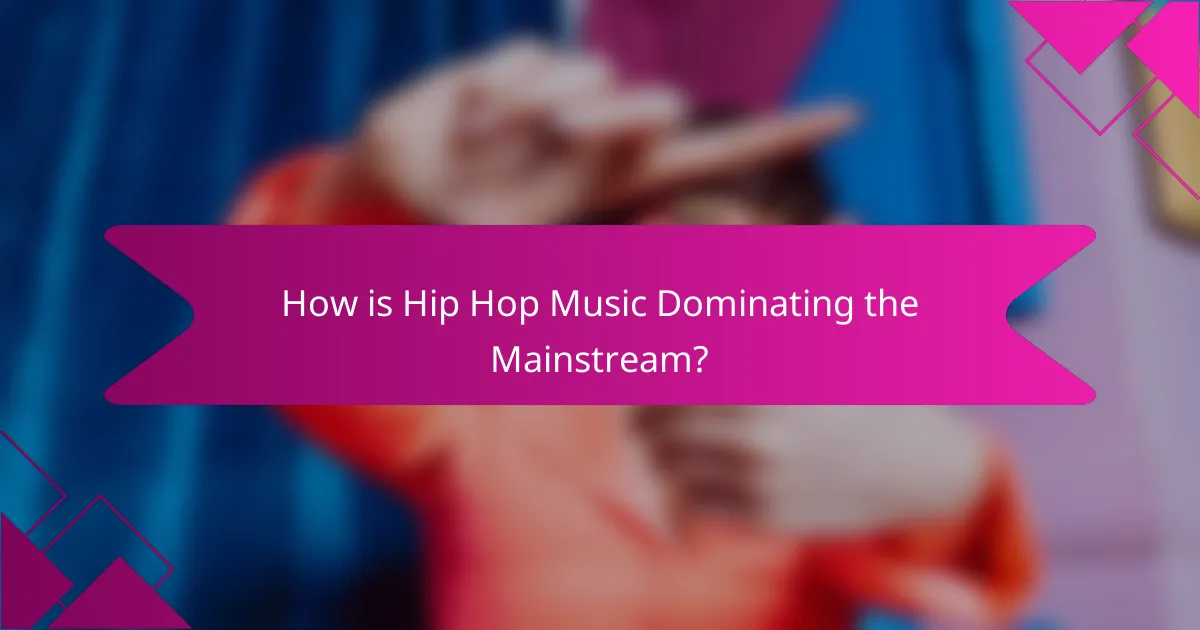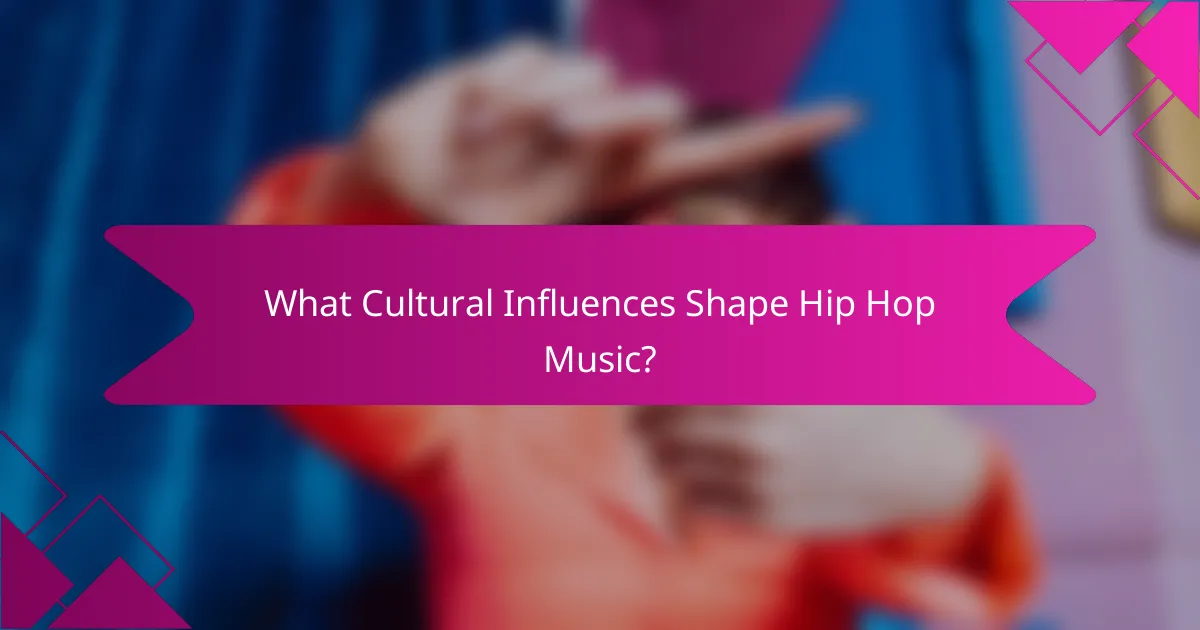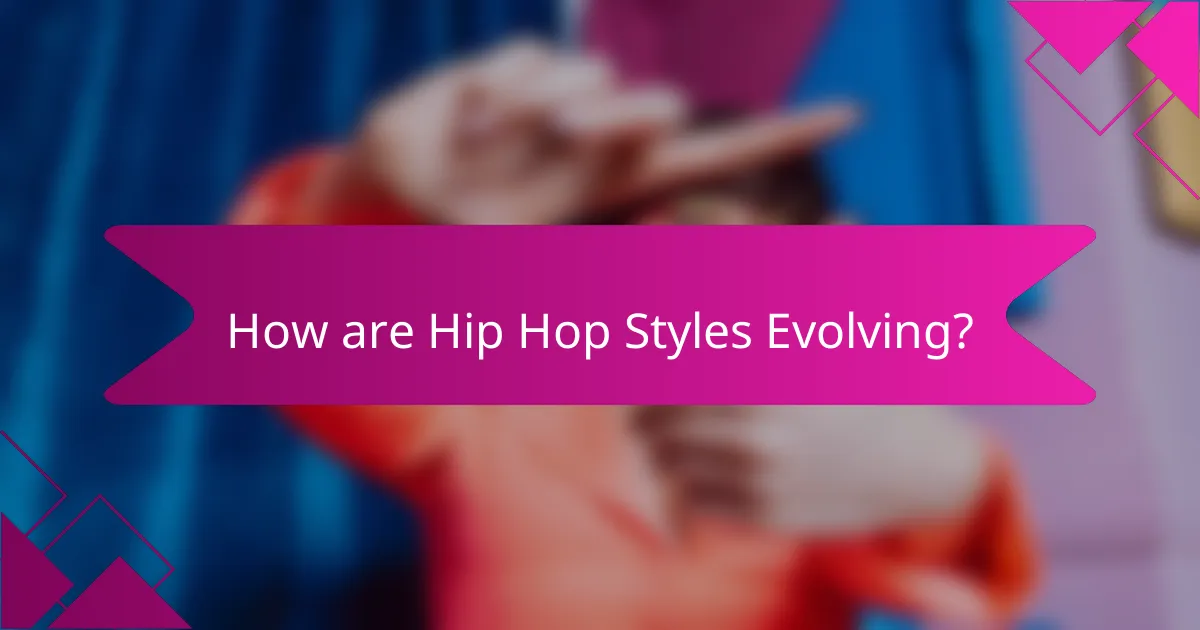Hip hop music has firmly established itself as a dominant force in the mainstream, influencing not only music charts but also fashion and social media trends. Rooted in African American traditions and shaped by urban environments, the genre continues to evolve through new sub-genres and global influences, showcasing its adaptability and widespread appeal.

How is Hip Hop Music Dominating the Mainstream?
Hip hop music is dominating the mainstream through its widespread appeal and integration into various aspects of popular culture. Its influence is evident in music charts, fashion, and social media, making it a key player in the entertainment industry.
Streaming platforms driving popularity
Streaming platforms like Spotify, Apple Music, and YouTube have significantly boosted hip hop’s reach. These services allow listeners to access a vast library of tracks, making it easier for new artists to gain exposure and for established artists to maintain their fan base.
Playlists curated by algorithms and user preferences often feature hip hop prominently, contributing to its chart-topping success. This accessibility has led to hip hop becoming one of the most streamed genres globally.
Influence of social media trends
Social media platforms such as TikTok and Instagram have transformed how hip hop music is promoted and consumed. Viral challenges and trends often feature hip hop tracks, driving their popularity and encouraging user-generated content.
Artists leverage these platforms to connect with fans directly, share snippets of their music, and engage in real-time discussions, further solidifying hip hop’s presence in mainstream culture.
Collaborations with pop artists
Collaborations between hip hop artists and pop musicians have become increasingly common, blending genres and expanding audiences. These partnerships often result in chart-topping hits that appeal to a broader demographic.
For example, tracks featuring hip hop artists alongside pop stars can achieve significant radio play and streaming success, showcasing the genre’s versatility and mainstream appeal.
Major music festivals featuring hip hop
Major music festivals like Coachella, Lollapalooza, and Glastonbury prominently feature hip hop artists, reflecting the genre’s mainstream acceptance. These events attract diverse audiences and provide a platform for both established and emerging hip hop talent.
Performances at these festivals often lead to increased visibility and sales for artists, further solidifying hip hop’s dominance in the music landscape.

What Cultural Influences Shape Hip Hop Music?
Cultural influences that shape hip hop music include its roots in African American traditions, the impact of urban environments, and the integration of fashion and lifestyle. These elements collectively contribute to the genre’s evolution and mainstream appeal.
Historical roots in African American culture
Key figures like DJ Kool Herc and Grandmaster Flash were instrumental in developing hip hop’s unique sound, using techniques like breakbeat and sampling. This cultural heritage continues to influence contemporary artists, who often pay homage to their predecessors through their music.
Impact of urban environments on lyrical themes
Urban environments significantly shape the lyrical themes of hip hop music, often reflecting the realities of life in cities. Artists frequently address issues such as poverty, violence, and systemic inequality, providing a voice for marginalized communities.
For instance, the gritty narratives found in tracks from artists like Nas or Kendrick Lamar highlight the challenges faced in urban settings. This connection to place not only informs the content but also resonates with listeners who share similar experiences.
Fashion and lifestyle integration
Fashion and lifestyle are integral to hip hop culture, influencing both the music and the artists’ public personas. The genre has popularized distinct styles, from baggy jeans to designer sneakers, which often serve as symbols of status and identity.
Collaborations between hip hop artists and fashion brands have further blurred the lines between music and lifestyle, creating trends that extend beyond the stage. This synergy enhances the cultural impact of hip hop, making it a significant force in both music and fashion industries.

How are Hip Hop Styles Evolving?
Hip hop styles are evolving through the emergence of new sub-genres, global influences, and advancements in technology. These changes reflect the genre’s adaptability and its ability to resonate with diverse audiences worldwide.
Emergence of sub-genres like trap and lo-fi
Sub-genres such as trap and lo-fi have significantly shaped the hip hop landscape. Trap, characterized by its use of hi-hats, heavy bass, and aggressive lyrics, has gained immense popularity, especially in the last decade.
Lo-fi, on the other hand, offers a more relaxed and atmospheric sound, often incorporating samples from jazz and electronic music. This genre appeals to listeners looking for a chill vibe, making it a staple in playlists for studying or relaxation.
Global influences from international artists
International artists are increasingly impacting hip hop, bringing unique cultural elements and sounds. For instance, artists from the UK have introduced grime, a genre that combines rapid-fire lyrics with distinctive beats, influencing American hip hop.
Similarly, artists from Latin America are integrating reggaeton rhythms into their hip hop tracks, creating a fusion that resonates with a broader audience. This cross-pollination enriches the genre and expands its reach globally.
Technological advancements in production
Technological advancements have revolutionized hip hop production, making it more accessible than ever. Digital audio workstations (DAWs) allow aspiring producers to create high-quality tracks from home, reducing the need for expensive studio time.
Additionally, tools like beat-making software and online collaboration platforms enable artists to experiment with sounds and collaborate across distances. This democratization of music production fosters innovation and diversity in hip hop styles.

What Are the Key Trends in Hip Hop Music Today?
Key trends in hip hop music today include the rise of independent artists, a heightened focus on mental health themes, and the integration of AI in music production. These trends reflect the genre’s evolving landscape and its response to cultural shifts.
Rise of independent artists
The rise of independent artists in hip hop has transformed the music industry, allowing creators to bypass traditional record labels. Many artists now leverage platforms like SoundCloud, Bandcamp, and social media to distribute their music directly to fans.
This shift has led to a more diverse range of voices and styles within the genre, as independent artists often experiment with unconventional sounds and themes. The financial benefits are significant, as artists retain a larger share of their earnings compared to those signed to major labels.
Increased focus on mental health themes
Hip hop is increasingly addressing mental health issues, with artists openly discussing topics like anxiety, depression, and self-care. This trend resonates with listeners, particularly younger audiences who value authenticity and vulnerability in music.
Tracks that explore mental health often include personal narratives and relatable experiences, fostering a sense of community and support among fans. Artists like Logic and Kid Cudi have paved the way, using their platforms to promote mental wellness and encourage open conversations.
Integration of AI in music production
The integration of AI in music production is reshaping how hip hop tracks are created. Tools powered by artificial intelligence can assist artists in generating beats, suggesting lyrics, and even mastering tracks, streamlining the production process.
While AI can enhance creativity, it also raises questions about originality and the role of human artistry. Artists should consider balancing AI-generated elements with their unique style to maintain authenticity in their work.

What Criteria Should You Consider When Exploring Hip Hop Music?
When exploring hip hop music, consider the artist’s credibility, cultural impact, and the evolution of their style. These factors help you understand the music’s significance and the artist’s role within the genre.
Artist credibility and background
Artist credibility is crucial in hip hop, as it often reflects authenticity and connection to the culture. Look into an artist’s history, including their upbringing, influences, and experiences that shape their music. For instance, artists who grew up in urban environments may draw from real-life experiences that resonate with their audience.
Researching an artist’s previous work and collaborations can also provide insight into their credibility. Established artists often collaborate with emerging talent, which can enhance their reputation and introduce fresh perspectives. Pay attention to the themes and messages in their lyrics, as these can reveal their commitment to the genre and its cultural roots.
Additionally, consider how an artist engages with their community and the broader hip hop culture. Artists who participate in social movements or support local initiatives often gain respect and credibility within the hip hop community. This engagement can influence their music and help them connect with fans on a deeper level.
